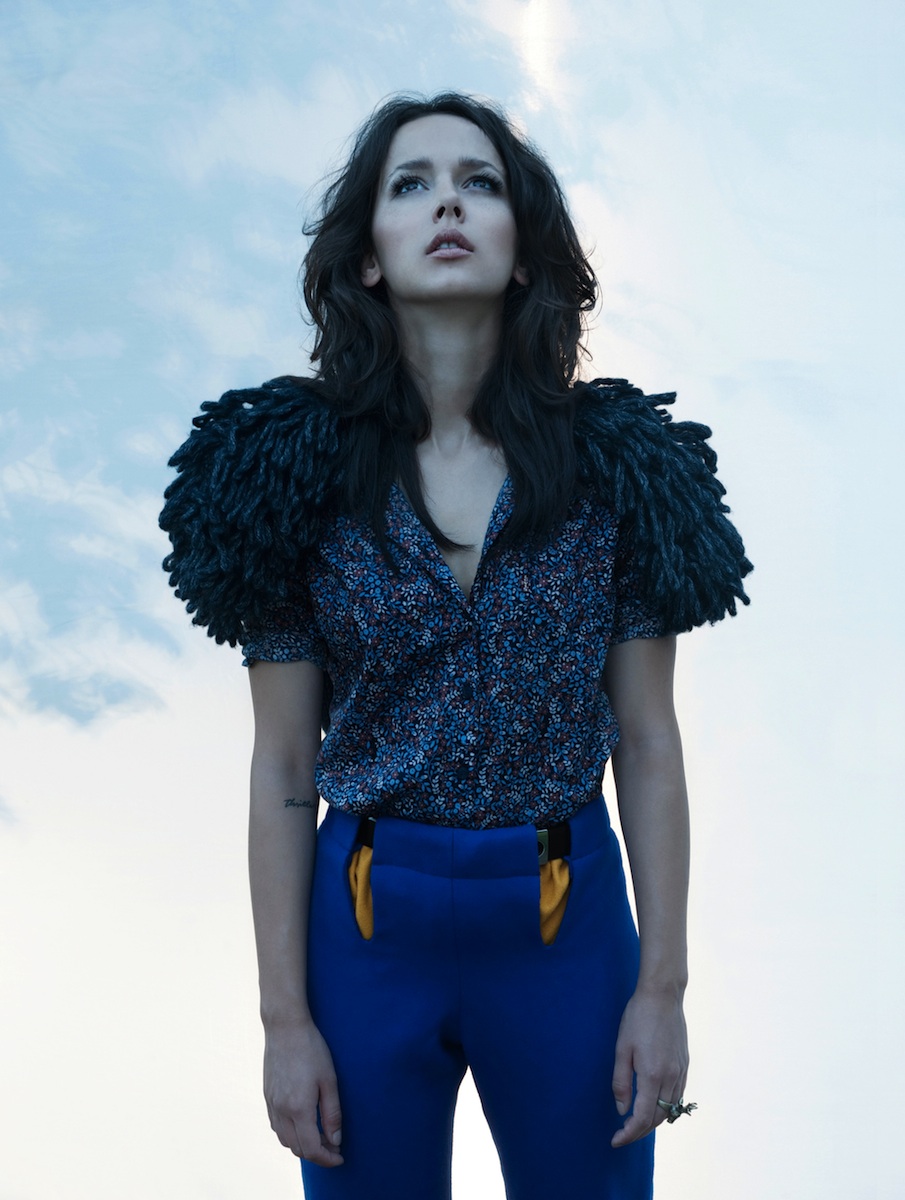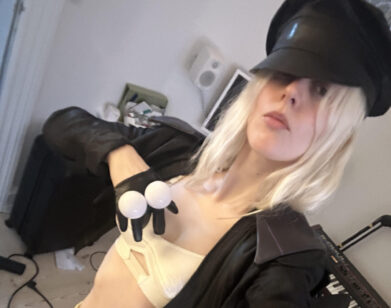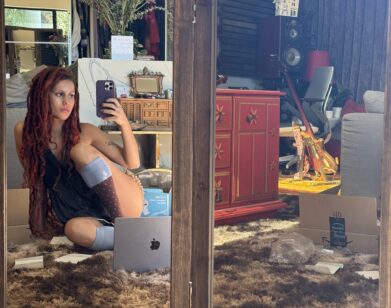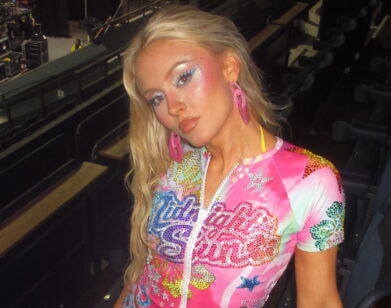Discovery: Brodka

ABOVE: MONIKA BRODKA
Monika Brodka was minted Poland’s pop princess at the age of 15 after winning the country’s Pop Idol competition in 2004. Nine years and three albums later, she laughs at the memory, praising the opportunity and shaking her head in equal parts. Now known simply as Brodka, the Warsaw-based singer/songwriter has come a long way from her high-profile start—emerging as the kind of idiosyncratic national icon for whom a mere note or single name says it all.
After two albums and a four-year hiatus, Brodka’s 2010 album Granda (slang for a mischievous/unexpected joke) saw the birth of an daring artist—one unafraid to flip the script and toy with unexpected textures, spiky electronics, and recontextualized traditional instruments. While she’s flirted with English lyrics (see 2012 EP LAX), the singer says that, for now anyway, she’s dedicated to the idea of continuing to sing in Polish. She has no reason to worry. There’s an expressive urgency to her work, assuring that whatever the language, the world will be listening.
We caught up with Brodka in Warsaw at her label’s offices. The singer-songwriter told us about the transition from country girl to big city life, embracing experimentation, and accidentally rewriting the Polish language. She also provided us with the exclusive premiere stream of her song “Varsovie.” Granda is out now via Sony Music. LAX is available via Kayax.

AGE: 26
HOMETOWN: Żywiec, Poland
CURRENT CITY: Warsaw, Poland
FROM NATURE TO CITY GIRL: I grew up in the village in the Polish mountains. I spent my childhood in the middle of nature with all the kids around. It was really cool. I have great memories of my childhood. I really appreciate the fact I was not growing up in the city… I started professionally when I was almost 16. I was 15. I won this silly TV competition. But I do not regret it. It was a really cool start for me. For someone who is not from Warsaw, who is from the deep south of Poland, it was a good start. I managed to do something with it, I think.
THE ORGINS OF GRANDA: I was a big fan of Justice. [laughs] You can’t really hear the influence on the album, I hope. I didn’t want that to happen. I was kind of obsessed with this band. I didn’t want to do hardcore electro and a video with kids and crosses on their back. I was listening to a lot of different music. Intense electro, to some indie-rock bands. It was a moment for MGMT and all the bands like that.
SNEAK ATTACK: Because I took a long break between albums, my label was not really aware if I was working on something. At this time, they were not really interested in what I was doing. It was pretty cool because I could close myself up with the producer and do whatever we wanted. We felt like the album was more or less ready, so we called someone and asked if they wanted to listen to it before it’s too late. Before they say, “There is no way we’re going to release this album.” It’s better to know before than after. So we called someone and said, “Okay, we have seven songs ready. Do you want to come and listen to it?” Some people came people came and said, “Oh yeah, I love it. It’s so obvious that you were recording an album like that right now!” It was kind of funny.
FINDING A COHORT/PRODUCER: I wanted someone to write the music together with. I also had this idea to use traditional folk instruments from my region. I wanted to go there and record them in an unusual modern way. So I was looking for someone who was going to be interested in that kind of concept. To go with me and try to do something crazy. A lot of people said, “Yeah, that’s cool, but I’m not really into it. I prefer just to take my guitar and write songs instead of spending two weeks in the Polish mountains and trying to record some bullshit.” But finally I found the perfect match—Bartek Dziedzic.
DADDY’S GIRL: We were recording with my father. He was playing all these instruments I remember from my childhood, because he also leads a folk band. I was playing in this band when I was really young. I remember all the sounds, and I was really curious if we were going to be able to take the sounds of these instruments and not connect them to folk music anymore.
He really likes the album. It’s not his kind of music, but he’s always happy for me when I have something to do with music and when I’m trying to experiment. He was really proud that he could play on my album and that he could be part of it and help me in some way. I was happy too that after 15 years of not playing together we had a reunion and we started to play again. It was a really sentimental trip.
SHE BLINDED US WITH SCIENCE: Since I recorded Granda, I’m treating all my albums as science projects. I always need to have a strong concept in my head of what I would like to do and explore. As a scientist who wants to discover something new, I need to discover something with my next album. I’m not really into sitting and writing music and collecting all the songs together and decide if they’re good or not and just release them. I need to have a strong idea behind the music. Then I’m starting to know what kind of instruments I’m going to use and what kind of people I’m going to work with, and who’s going to be the producer. I just need a theme… I have an idea in my head right now, but I feel like it’s just the beginning of an idea. I’m really happy that it popped out in my head, finally after three years. But it’s a strange idea and I don’t know if I will be able to do it. So I will start to think about it and talk to some other people about it. I have to collect knowledge about the subject first, because it’s really funny.
SAYING SO LONG TO ENGLISH LYRICS: I always thought that it was going to be a big problem, if you want to tour outside of Poland. But actually, people like the Polish lyrics more than the English ones. They found it more exotic and interesting. I identify myself with these lyrics. You can really hear the story behind the lyrics even though you don’t understand them, more than in my English ones so far. I’m pretty happy that it’s not a big deal that we have songs in Polish. But I don’t know what about the next album yet in terms of lyrics…
FINDING “GRANDA” FUN: It is joyful music, but not stupid or naïve. We’ve been trying to make happy, joyful songs with smart lyrics and a message. So, it was tricky to write the lyrics. I really wanted them to fit the crazy instruments that we used. I knew I needed a twist in the lyrics. Even though you’re talking about important and hard topics like a broken heart, you need to contrast it with some funny words. I also wanted to use some words that are not used anymore. Bring them to life again. Especially young people don’t know these words. We decided to look up the dictionary and find some nice words. Granda is a word that people didn’t use for many, many years, and now they’ve started to use it again because of the album. They were like, “Ah! This is such a funny, cool word!”
FOR MORE ON BRODKA, VISIT HER FACEBOOK PAGE.






